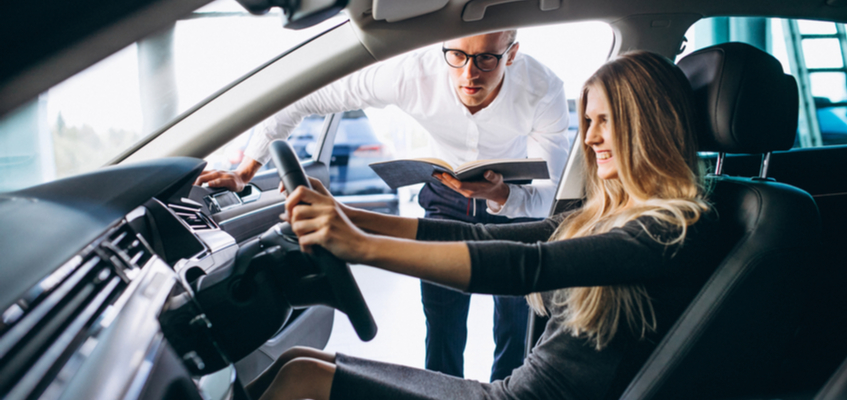Buying a car can be an exciting but also stressful time, as you navigate a world of models and trims, safety ratings and fuel economy, on-board computers and heated seats, MOT and road tax. Buying a car is probably one of the biggest purchase you’ll make and you want to get it right.
So before you rush off to the dealership, used car lot, or the pages of Auto Trader, make sure you’re prepared. Our checklist can guide you through the process of purchasing a new vehicle, whether you’re looking for a reliable second-hand car or a model fresh off the assembly line.
In This Guide:
Know your budget
Your first step toward your ideal car is determining your budget. This will guide you to the correct sector of the market, whether it’s used city cars or luxury executive cars with that new car smell.
Remember that the price painted on the windscreen or quoted in the adverts isn’t the only cost you’ll face. You also need the consider the everyday running costs of the car and more occasional costs like insurance, road tax, MOT, and maintenance and repairs.
- Consider the purchase price: How much can you afford to pay upfront for a vehicle? If you opt for a car finance plan, how much can you comfortably pay each month?
- Fuel costs: What’s the fuel economy of your car? How much will you drive each month and how often will you have to refill your tank (or recharge, if you opt for an electric vehicle)? Efficient vehicles may be more expensive to purchase, but can more than make up for that with low fuel costs.
- Road tax, also known as Vehicle Excise Duty (VED): This is an annual tax you pay based on the carbon emissions of your vehicle. Older used cars can be heavily polluting and leave you paying hundreds annually in road tax. On the other hand, pure electric vehicles with zero running emissions are exempt from road tax.
- MOT: If you’re buying a used car, be aware that cars over three years old face an annual MOT test of their roadworthiness. The test itself is price-capped at £54.85, but may reveal problems you’re required to have fixed.
- Factor in car insurance: Premiums are usually steep for new drivers, but you can minimise your costs by choosing a lighter, smaller, inexpensive vehicle.
Find the car you want

Within your price range, you’ll find hundreds of makes and models. To further narrow down your search, make a list of the features you prioritise in a car, from a spacious boot or four-wheel drive, to a five-star Euro NCAP safety rating or a slim profile perfect for urban parking.
Have a dream car? Don’t spend more than you can comfortably afford, but also don’t rule out must-have models. You can reduce the price of a vehicle by opting for a cheaper trim, for example by ditching bells and whistles like power seats and push-button ignition, or opting for a smaller engine or fewer doors.
Used vehicles are another great way to save money. Cars depreciate in value so quickly that you can snag a three-year-old car for 60% less than its original price. But be aware of pitfalls like higher road tax, lower fuel efficiency, and the potential for costly repairs. New cars also come with manufacturer’s warranties and are easier to finance, allowing you to spread out the cost into manageable amounts.
The following models are reliable favourites for new drivers. They’re all affordable, easy to drive, and have stellar safety ratings:
- Ford Fiesta: A perennial bestseller in the UK, new Fiestas start at just £16,385, or £165 a month. They come kitted out with nimble steering, lots of room, a five-star Euro NCAP rating, and plenty of high-tech gadgets. The market is also awash with even cheaper, used Fiestas.
- Hyundai i10: This best-in-class city car starts at £12,590 new. It has a zippy engine, a four-star safety rating, and more space inside than its tiny footprint would suggest.
- SEAT Mii Electric: Many young drivers are concerned about their carbon footprint and prefer an electric car, like this entry-level model from SEAT. You’ll pay more upfront for the Seat Mii Electric (prices start at £20,300), but you’ll avoid road tax and save hundreds or even thousands every year on fuel.
Check the car

When buying a car, there are a few things you should double-check before you grab the keys and drive off. This is particularly true if you’re buying a used vehicle from a private seller. You don’t have much recourse if you complete the purchase and the car isn’t as described:
- Check the VC5: The vehicle registration certification, also called the V5C or logbook, should be a red and blue piece of paper - not a copy or printout - and should list a Vehicle Identification Number (VIN) and engine number that match those stamped on the vehicle. You’ll need this information to tax the vehicle.
- Ask for MOT certificates: If the vehicle is three years old or more, you should also ask to see current and past MOT certificates, which will identify any problems with the vehicle and verify the mileage you see on the odometer is real. You can also ask to see service records.
- Test: The lights, locks, windows, seatbelts, controls for the radio and air conditioning, and wipers to see if they work
- See if tyres have sufficient tread: If not, they may need to be replaced.
- Check for signs of rust or welding: Particularly under the bonnet, in the boot, under the car, and beneath the footwell mats.
- Take it for a drive: Test the clutch and brakes; shift gears to see if the transmission is smooth; get on the motorway to check how the car performs at speeds over 60mps. See if the steering wheel vibrates.
Get insured
It’s a legal requirement to have insurance for any vehicle, even if you’ve just bought it and are driving it home.
If you want more time to find an annual policy, you can get short-term drive away insurance that covers you for the first hours or days you own the vehicle. Some dealers will try to upsell you drive away insurance, but you’re not obligated to purchase it and cover from elsewhere may be cheaper.
As a young driver, you’ll likely pay more for insurance. This is especially true if you’re under 25 and didn’t have much driving experience before purchasing your first vehicle. Young drivers can limit costs by opting for a telematics policy. These policies install a black box in your vehicle that monitors your driving and rewards good behaviour with insurance discounts.
You should also consider GAP insurance. It is common knowledge that new cars depreciate in value as soon as they are taken off the lot, and if you’re involved in an accident, your insurer will only cover the current value of your vehicle. GAP insurance is designed to cover the depreciation cost so you won’t have to pay out of your own money should something happen.
Pay tax
Another step you must take immediately is to pay road tax. Even if the vehicle is zero-emission and exempt, you must still register it for tax. If you’re buying the vehicle from a dealership, the car will be taxed at the point of sale. If you purchase it from a private owner, you can tax the car online with information from the logbook and should ideally do so before driving away. You can also pay road tax at Post Office locations.
Do I need to change or cancel my existing insurance policy?
When selling your old car, or part-exchanging it for a new model, you will need to inform your insurer. You can then either renew your current policy onto the new car or cancel your policy all together and get a new one.
Carrying your existing policy over will incur an admin fee of around £25 (depending on your insurer) and may end up with higher premiums depending on your insurers assessment of your new car.
Cancelling your policy can end up being cheaper, if you time it right. If you cancel during the term of your contract, you will likely have to pay a cancelation fee which will be offset by a refund for the total amount remaining on your policy (if paid annually). You will also lose your no claims bonus for that year, so it may be worth waiting until your policy is at its end before buying a new car.






